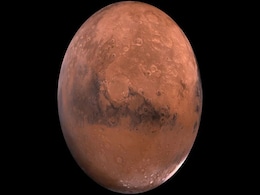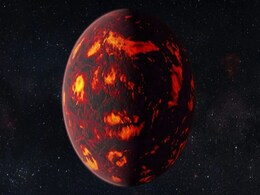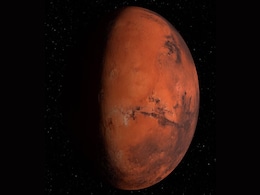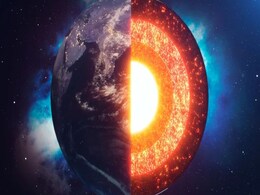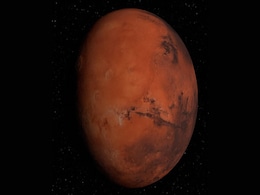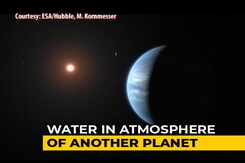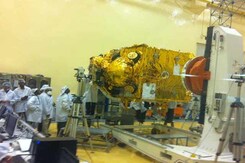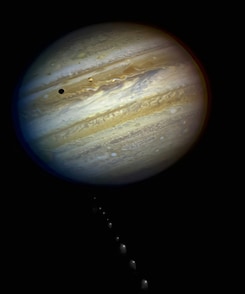Planet Study
- All
- News
- Videos
- Web Stories
-

Earth-Like Exoplanets More Common Across The Cosmos: Study
- Sunday April 27, 2025
- Science | Asian News International
The findings in the study were made via microlensing, an observational effect that occurs when the presence of mass warps the fabric of space-time to a detectable degree.
-
 www.ndtv.com
www.ndtv.com
-

Super Earths are Quite Common Outside the Solar System, New Study Reveals
- Saturday April 26, 2025
- Written by Gadgets 360 Staff
Using the microlensing technique, KMTNet studied the exoplanet, which is twice as big as Earth, yet smaller than Neptune. It is believed that there are more such super-Earths outside our solar system. It is common to have such planets orbiting their stars.
-
 www.gadgets360.com
www.gadgets360.com
-

Water on Ancient Mars? New Study Challenges the Cold Planet Theory
- Saturday April 26, 2025
- Written by Gadgets 360 Staff
Scientists have uncovered compelling evidence suggesting that early Mars was surprisingly wet, featuring extensive networks of lakes and river basins shaped by rainfall and snowfall. This challenges long-held views of a predominantly cold and icy ancient Mars. Despite current climate models struggling to explain sustained liquid water on the Red Pl...
-
 www.gadgets360.com
www.gadgets360.com
-

Earth’s Mantle Could Be Harbouring Ocean of Magma Formed Billions of Years Ago, Claims Study
- Thursday April 17, 2025
- Written by Gadgets 360 Staff
The study conducted by Boukaré and published on March 26 in the Journal Nature suggests that this molten layer at the core-mantle boundary of the Earth formed the internal thermal structure of the planet and tectonic plates. This may still influence the geochemical process of the Earth today. Further, it suggests a similar magma ocean existence on...
-
 www.gadgets360.com
www.gadgets360.com
-

Oceans Were Once Green, Could Change Colour Again: Study
- Thursday April 10, 2025
- World News | The Conversation
Nearly three fourths of Earth is covered by oceans, making the planet look like a pale blue dot from space. But Japanese researchers have made a compelling case that Earth's oceans were once green, in a study published in Nature.
-
 www.ndtv.com
www.ndtv.com
-

Astronomers Detect Methane in the Atmosphere of the Nearest T Dwarf Star to Earth
- Saturday April 12, 2025
- Written by Gadgets 360 Staff
Astronomers have detected methane in the nearest known T dwarf, offering new insight into its atmospheric composition. The study further highlights that the carbon abundance in the planet is estimated to be -1.5 dex, while the effective temperature could be around 1,000 K. The author of the paper further revealed that the low metallicity of the T ...
-
 www.gadgets360.com
www.gadgets360.com
-

New Study Reveals Chemical Secret Of Earth's 4.5 Years Billion Crust
- Thursday April 3, 2025
- Science | Simon Turner, The Conversation
Earth is the only known planet which has plate tectonics today. The constant movement of these giant slabs of rock over the planet's magma creates continents - and may have even helped create life.
-
 www.ndtv.com
www.ndtv.com
-

JWST Captures Unseen Details of Exoplanets in HR 8799 and 51 Eridani Systems
- Thursday April 3, 2025
- Written by Gadgets 360 Staff
The James Webb Space Telescope (JWST) has captured groundbreaking images of exoplanets in the HR 8799 and 51 Eridani systems. By modifying its coronagraphs, astronomers allowed more starlight to pass through, revealing clearer planetary details. The study, published in The Astrophysical Journal Letters, highlights the first successful detection of ...
-
 www.gadgets360.com
www.gadgets360.com
-

Two New Exoplanets Found Orbiting a Star in Draco Constellation
- Wednesday April 2, 2025
- Written by Gadgets 360 Staff
Astronomers have identified two exoplanets, TOI-1453 b and TOI-1453 c, orbiting a star 250 light-years away in Draco. The planets, a super-Earth and a sub-Neptune, were detected using NASA’s TESS satellite and the HARPS-N spectrograph. TOI-1453 b is a rocky planet orbiting close to its star, while TOI-1453 c is twice Earth’s size and may have a...
-
 www.gadgets360.com
www.gadgets360.com
-

New Study Challenges Claims of Vast Underground Water on Mars
- Thursday March 27, 2025
- Written by Gadgets 360 Staff
Mars’ water history remains a mystery as new research questions the claim that vast amounts of water are stored beneath its surface. A study led by Bruce Jakosky argues that previous estimates of Mars’ mid-crust being saturated with liquid water may be inaccurate. The findings challenge earlier interpretations of seismic data from NASA’s InSi...
-
 www.gadgets360.com
www.gadgets360.com
-

Alien Life May Survive on Planets Orbiting White Dwarfs, Study Finds
- Wednesday March 26, 2025
- Written by Gadgets 360 Staff
New research explores the possibility of alien life on planets orbiting white dwarfs. While these stellar remnants cool over time, their shrinking habitable zones may still allow biological processes like photosynthesis and UV-driven abiogenesis to occur. A model assessing a planet's energy reception over seven billion years indicates that life-sus...
-
 www.gadgets360.com
www.gadgets360.com
-

James Webb Space Telescope Observes Mysterious Rogue Planet-Like Object
- Thursday March 6, 2025
- Written by Gadgets 360 Staff
The James Webb Space Telescope has captured new insights into SIMP 0136, a planetary-mass object floating freely around 20 light-years away. This celestial body, possibly a rogue planet or a brown dwarf, has puzzled astronomers for years. JWST’s infrared observations have revealed intricate cloud layers, temperature shifts, and potential chemical...
-
 www.gadgets360.com
www.gadgets360.com
-

Primordial Helium-3 May Be Locked in Earth’s Core, Study Finds
- Wednesday March 5, 2025
- Written by Gadgets 360 Staff
Helium-3, an isotope formed during the solar system's birth, may be trapped in Earth's core, a study suggests. Researchers at the University of Tokyo found that helium can mix with iron at extreme heat and pressure, allowing it to remain in Earth's solid core. This discovery could help determine how quickly the planet formed, with a rapid formation...
-
 www.gadgets360.com
www.gadgets360.com
-

Solar System’s Journey Through Orion Complex May Have Altered Earth’s Climate
- Monday March 3, 2025
- Written by Gadgets 360 Staff
Scientists have studied the solar system’s passage through the Orion complex, a dense region in space, around 14 million years ago. According to researchers, this movement may have compressed the heliosphere and increased interstellar dust reaching Earth. This dust could have influenced the planet’s climate and left traces in geological records...
-
 www.gadgets360.com
www.gadgets360.com
-

New Research Reveals Mars’ Red Colour Linked to Ancient Water Presence
- Monday March 3, 2025
- Written by Gadgets 360 Staff
A recent study suggests that Mars’ red hue originates from ferrihydrite, an iron oxide that forms in water-rich environments. Scientists recreated Martian dust in labs and found that the mineral remained stable despite the planet’s dry conditions. Data from orbiting spacecraft and rovers confirm this discovery, reshaping theories about Mars’ ...
-
 www.gadgets360.com
www.gadgets360.com
-

Earth-Like Exoplanets More Common Across The Cosmos: Study
- Sunday April 27, 2025
- Science | Asian News International
The findings in the study were made via microlensing, an observational effect that occurs when the presence of mass warps the fabric of space-time to a detectable degree.
-
 www.ndtv.com
www.ndtv.com
-

Super Earths are Quite Common Outside the Solar System, New Study Reveals
- Saturday April 26, 2025
- Written by Gadgets 360 Staff
Using the microlensing technique, KMTNet studied the exoplanet, which is twice as big as Earth, yet smaller than Neptune. It is believed that there are more such super-Earths outside our solar system. It is common to have such planets orbiting their stars.
-
 www.gadgets360.com
www.gadgets360.com
-

Water on Ancient Mars? New Study Challenges the Cold Planet Theory
- Saturday April 26, 2025
- Written by Gadgets 360 Staff
Scientists have uncovered compelling evidence suggesting that early Mars was surprisingly wet, featuring extensive networks of lakes and river basins shaped by rainfall and snowfall. This challenges long-held views of a predominantly cold and icy ancient Mars. Despite current climate models struggling to explain sustained liquid water on the Red Pl...
-
 www.gadgets360.com
www.gadgets360.com
-

Earth’s Mantle Could Be Harbouring Ocean of Magma Formed Billions of Years Ago, Claims Study
- Thursday April 17, 2025
- Written by Gadgets 360 Staff
The study conducted by Boukaré and published on March 26 in the Journal Nature suggests that this molten layer at the core-mantle boundary of the Earth formed the internal thermal structure of the planet and tectonic plates. This may still influence the geochemical process of the Earth today. Further, it suggests a similar magma ocean existence on...
-
 www.gadgets360.com
www.gadgets360.com
-

Oceans Were Once Green, Could Change Colour Again: Study
- Thursday April 10, 2025
- World News | The Conversation
Nearly three fourths of Earth is covered by oceans, making the planet look like a pale blue dot from space. But Japanese researchers have made a compelling case that Earth's oceans were once green, in a study published in Nature.
-
 www.ndtv.com
www.ndtv.com
-

Astronomers Detect Methane in the Atmosphere of the Nearest T Dwarf Star to Earth
- Saturday April 12, 2025
- Written by Gadgets 360 Staff
Astronomers have detected methane in the nearest known T dwarf, offering new insight into its atmospheric composition. The study further highlights that the carbon abundance in the planet is estimated to be -1.5 dex, while the effective temperature could be around 1,000 K. The author of the paper further revealed that the low metallicity of the T ...
-
 www.gadgets360.com
www.gadgets360.com
-

New Study Reveals Chemical Secret Of Earth's 4.5 Years Billion Crust
- Thursday April 3, 2025
- Science | Simon Turner, The Conversation
Earth is the only known planet which has plate tectonics today. The constant movement of these giant slabs of rock over the planet's magma creates continents - and may have even helped create life.
-
 www.ndtv.com
www.ndtv.com
-

JWST Captures Unseen Details of Exoplanets in HR 8799 and 51 Eridani Systems
- Thursday April 3, 2025
- Written by Gadgets 360 Staff
The James Webb Space Telescope (JWST) has captured groundbreaking images of exoplanets in the HR 8799 and 51 Eridani systems. By modifying its coronagraphs, astronomers allowed more starlight to pass through, revealing clearer planetary details. The study, published in The Astrophysical Journal Letters, highlights the first successful detection of ...
-
 www.gadgets360.com
www.gadgets360.com
-

Two New Exoplanets Found Orbiting a Star in Draco Constellation
- Wednesday April 2, 2025
- Written by Gadgets 360 Staff
Astronomers have identified two exoplanets, TOI-1453 b and TOI-1453 c, orbiting a star 250 light-years away in Draco. The planets, a super-Earth and a sub-Neptune, were detected using NASA’s TESS satellite and the HARPS-N spectrograph. TOI-1453 b is a rocky planet orbiting close to its star, while TOI-1453 c is twice Earth’s size and may have a...
-
 www.gadgets360.com
www.gadgets360.com
-

New Study Challenges Claims of Vast Underground Water on Mars
- Thursday March 27, 2025
- Written by Gadgets 360 Staff
Mars’ water history remains a mystery as new research questions the claim that vast amounts of water are stored beneath its surface. A study led by Bruce Jakosky argues that previous estimates of Mars’ mid-crust being saturated with liquid water may be inaccurate. The findings challenge earlier interpretations of seismic data from NASA’s InSi...
-
 www.gadgets360.com
www.gadgets360.com
-

Alien Life May Survive on Planets Orbiting White Dwarfs, Study Finds
- Wednesday March 26, 2025
- Written by Gadgets 360 Staff
New research explores the possibility of alien life on planets orbiting white dwarfs. While these stellar remnants cool over time, their shrinking habitable zones may still allow biological processes like photosynthesis and UV-driven abiogenesis to occur. A model assessing a planet's energy reception over seven billion years indicates that life-sus...
-
 www.gadgets360.com
www.gadgets360.com
-

James Webb Space Telescope Observes Mysterious Rogue Planet-Like Object
- Thursday March 6, 2025
- Written by Gadgets 360 Staff
The James Webb Space Telescope has captured new insights into SIMP 0136, a planetary-mass object floating freely around 20 light-years away. This celestial body, possibly a rogue planet or a brown dwarf, has puzzled astronomers for years. JWST’s infrared observations have revealed intricate cloud layers, temperature shifts, and potential chemical...
-
 www.gadgets360.com
www.gadgets360.com
-

Primordial Helium-3 May Be Locked in Earth’s Core, Study Finds
- Wednesday March 5, 2025
- Written by Gadgets 360 Staff
Helium-3, an isotope formed during the solar system's birth, may be trapped in Earth's core, a study suggests. Researchers at the University of Tokyo found that helium can mix with iron at extreme heat and pressure, allowing it to remain in Earth's solid core. This discovery could help determine how quickly the planet formed, with a rapid formation...
-
 www.gadgets360.com
www.gadgets360.com
-

Solar System’s Journey Through Orion Complex May Have Altered Earth’s Climate
- Monday March 3, 2025
- Written by Gadgets 360 Staff
Scientists have studied the solar system’s passage through the Orion complex, a dense region in space, around 14 million years ago. According to researchers, this movement may have compressed the heliosphere and increased interstellar dust reaching Earth. This dust could have influenced the planet’s climate and left traces in geological records...
-
 www.gadgets360.com
www.gadgets360.com
-

New Research Reveals Mars’ Red Colour Linked to Ancient Water Presence
- Monday March 3, 2025
- Written by Gadgets 360 Staff
A recent study suggests that Mars’ red hue originates from ferrihydrite, an iron oxide that forms in water-rich environments. Scientists recreated Martian dust in labs and found that the mineral remained stable despite the planet’s dry conditions. Data from orbiting spacecraft and rovers confirm this discovery, reshaping theories about Mars’ ...
-
 www.gadgets360.com
www.gadgets360.com



